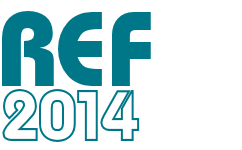 BU will be hosting a half day Research Excellence Framework (REF) event, supported by the REF team, on 22 February 2012 to which all staff are invited to attend.
BU will be hosting a half day Research Excellence Framework (REF) event, supported by the REF team, on 22 February 2012 to which all staff are invited to attend.
Book your place now by completing the online registration form
This event follows hot on the heels of the first REF event held at BU on 19 May 2011, to which over 150 delegates from 39 institutions attended (see our previous blog post – The excellent REF event at BU!).
The sector-wide consultation on the proposed REF panel criteria closed earlier this month and the final documents are due to be published in January 2012. This event will provide an update on the current developments with the REF and the confirmed REF panel documentation, focusing specifically on the assessment of impact within each of the four Main Panels.
The event will be open to BU staff and external delegates and the provisional programme is shown below.
| Time | Activity |
|---|---|
| 09:30 – 10:00 | Coffee and registration |
| 10:00 – 10:30 | REF Team overview of the assessment framework Chris Taylor, Deputy REF Project Manager, REF Team |
| 10:30 – 11:00 | Similarities between the four Main Panel working methods and criteria Professor Stephen Holgate, Chair of Main Panel A |
| 11:00 – 11:30 | Morning break |
| 11:30 – 12:15 | Panel specifics, differences and impact assessment There will be concurrent sessions, one for each of the four Main Panels. Attendees choose which one to attend.
|
| 12:15 – 13:00 | Panel Q&A session with all participants |
| 13:00 – 14:00 | Lunch, networking and close |
The event is free to attend but booking is essential.
Book your place now by completing the online registration form


 I work at the University on a part-time basis. Can I still be submitted to the REF? – As above, the REF recognises part-time working as a clearly defined circumstance which can result in a researcher being unable to produce four outputs during the REF assessment period. It is likely this will be dealt with on a pro-rata basis, e.g. a researcher who has been on a 0.5 FTE contract throughout the REF period is likely to be required to submit 2 outputs. Further details will be included in the BU REF Code of Practice.
I work at the University on a part-time basis. Can I still be submitted to the REF? – As above, the REF recognises part-time working as a clearly defined circumstance which can result in a researcher being unable to produce four outputs during the REF assessment period. It is likely this will be dealt with on a pro-rata basis, e.g. a researcher who has been on a 0.5 FTE contract throughout the REF period is likely to be required to submit 2 outputs. Further details will be included in the BU REF Code of Practice. This first exercise was considered to be a ‘light touch’ review as the external reviewers were not asked to look in detail at each output but to provide general comments about an individual’s research profile and an overview assessment of the UOA as a whole.
This first exercise was considered to be a ‘light touch’ review as the external reviewers were not asked to look in detail at each output but to provide general comments about an individual’s research profile and an overview assessment of the UOA as a whole.

 Bibliometrics pilot – HEFCE ran a pilot exercise in the construction of bibliometric indicators of research quality in 2008-09, using
Bibliometrics pilot – HEFCE ran a pilot exercise in the construction of bibliometric indicators of research quality in 2008-09, using  The REF will assess research excellence through a process of expert review, informed by indicators where appropriate. It will be based on HEIs submitting evidence of their research activity and outcomes, to be assessed by expert panels.
The REF will assess research excellence through a process of expert review, informed by indicators where appropriate. It will be based on HEIs submitting evidence of their research activity and outcomes, to be assessed by expert panels. Then we want to hear from you! 🙂
Then we want to hear from you! 🙂















 Beyond Academia: Exploring Career Options for Early Career Researchers – Online Workshop
Beyond Academia: Exploring Career Options for Early Career Researchers – Online Workshop UKCGE Recognised Research Supervision Programme: Deadline Approaching
UKCGE Recognised Research Supervision Programme: Deadline Approaching SPROUT: From Sustainable Research to Sustainable Research Lives
SPROUT: From Sustainable Research to Sustainable Research Lives BRIAN upgrade and new look
BRIAN upgrade and new look Seeing the fruits of your labour in Bangladesh
Seeing the fruits of your labour in Bangladesh ECR Funding Open Call: Research Culture & Community Grant – Apply now
ECR Funding Open Call: Research Culture & Community Grant – Apply now ECR Funding Open Call: Research Culture & Community Grant – Application Deadline Friday 12 December
ECR Funding Open Call: Research Culture & Community Grant – Application Deadline Friday 12 December MSCA Postdoctoral Fellowships 2025 Call
MSCA Postdoctoral Fellowships 2025 Call ERC Advanced Grant 2025 Webinar
ERC Advanced Grant 2025 Webinar Update on UKRO services
Update on UKRO services European research project exploring use of ‘virtual twins’ to better manage metabolic associated fatty liver disease
European research project exploring use of ‘virtual twins’ to better manage metabolic associated fatty liver disease